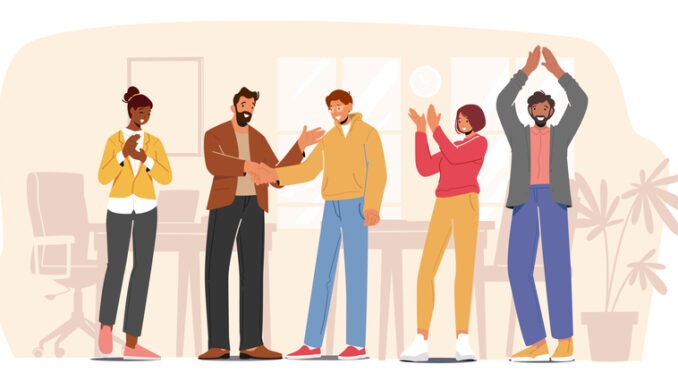
Knowing how to introduce yourself can help you make a great first impression; here are some tips to help you
CREDIT: This is an edited version of an article that originally appeared on Indeed
An ideal way to improve your social skills in professional and casual situations is to practise introducing yourself. Strong social skills, punctuality and manners can help you meet new people and advance through your professional career; knowing how to introduce yourself effectively can help you to make a good first impression both in the workplace and socially.
Introducing yourself at a casual meeting
In a casual setting in the office, such as an introductory meeting or a team outing, keeping your introduction cheerful and concise, while staying specific and personal, can help those listening get a quick idea of who you are. Making a few business-appropriate jokes can help lighten the mood and create a positive impression, but staying relevant to the introduction is important.
Meeting new clients outside the office
Meeting clients outside business hours is an opportunity for you to interact with them on a more personal level, which may help in future business negotiations, as you have created a certain rapport with each other. Body language is just as important as verbal language in these situations. Creating a relationship between you and the client helps them feel appreciated and confident that you value them.
Creating an email for an individual you haven’t met
Emails are one of the most common forms of digital communication so it’s important to understand the correct email etiquette and how to use it to converse with other people. There is a stark difference between introducing yourself in a professional, purposeful manner and chatting in a casual, friendly tone. Emails are an effective form of communication to set up more impactful, in-person, meetings.
The benefits of a powerful introduction
Having the confidence and appropriate social skills to produce a powerful introduction allows you to present yourself, whether in a professional or casual business environment, in a way that creates a positive first impression. Other benefits may include:
- Establishes credibility – introductions are the perfect time to let new people know who you are and what you’re bringing to the organisation. You can briefly state your value as an employee and establish your credibility in the field.
- Develops your professional network – a good self-introduction sets the foundation for relationships, and you can use it as a basis to further develop relationships and acquaintances. It’s useful to have a well-built professional network as you progress in your career, and your introduction is the first stage in establishing one.
- Assists in client negotiations – getting to know clients better on a personal level is a strategy that many use to close deals with important clients. If you introduce yourself efficiently and succinctly, you can develop a mutually beneficial relationship with your client, prompting them to have a more favourable opinion of you.
- Builds your confidence – introducing yourself, and getting to know your team and peers, is an effective way to build your social confidence. You may feel more comfortable speaking with others, and collaborating, after introducing yourself.
Efficient and successful introductions rely on social skills that come naturally to some people. There are certain psychological tactics and cues you can use to your advantage to improve aspects of your social and professional life. Here are some general steps to assist you when introducing yourself in a casual business environment.
Understand the audience – regardless of the environment or social situation, it’s important to understand who you’re talking to and to carefully choose what kind of language and vocabulary you use in front of them. In more lively and casual settings, you can show the more relaxed side of your personality, but it’s still important you stay polite and well-mannered. You can develop your professional network by interacting and introducing yourself to peers and building a relationship with them, but you may want to adopt a more respectful and distant attitude to your superiors in the organisation.
Consider body language – even in casual business settings, body language plays a significant role in your interaction with others. A closed and detached posture may give others the impression that you’re uncomfortable in their presence or you’re nervous. Conversely, overly confident body language, such as crossing your legs, leaning back or focusing your attention on something else, may give others the impression that you feel superior to them. The ideal posture is sitting or standing up in a relaxed yet focused manner. Try to make good eye contact and use other positive gestures, such as head-nodding and smiling, when appropriate.
Be concise and specific – keep your language and vocabulary concise, and easy to understand, as you are participating in a more casual event rather than presenting a report or taking part in a highly technical meeting. When discussing a topic, ensure you balance the amount of information you provide by being specific enough to convey your message, but concise enough to keep your audience’s attention.



Be the first to comment